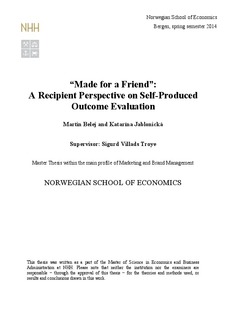| dc.description.abstract | This thesis examines the effects of self-production on outcome evaluations and preferred level
of involvement in the self-production task. Although several studies have already addressed
this issue, we extend these findings and emphasize the importance of the recipient of the
outcome of self-production, which appears often to be ignored. In two experimental studies,
we distinguish between self-production for oneself and self-production for someone else, and
investigate the effects and potential differences with regard to this aspect.
In Study 1, we hypothesized that self-production for someone else results in more negative
outcome evaluations and higher preferences for low self-production treatment. Moreover, we
assumed a self-produced outcome (the coffee) mainly reflects the self-producer’s ideal selfconcept
when adapted for a friend. Eight hypotheses are subsequently proposed, for situations
involving preparing a coffee under two different levels of self-production produced for either
oneself or someone else, i.e. a friend. All of them are supported by theories from academic
articles, books and other relevant marketing sources. A real self-production experiment design
was chosen: the data were obtained from students with different international background.
The findings from Study 1 demonstrate that self-production for a friend does not result in
more negative outcome evaluations. In fact, there were no significant differences in outcome
evaluations between self-producers that were preparing the outcome for themselves and selfproducers
that were preparing the outcome for their friend. Moreover, results did not show
higher preferences for low-self-production treatment when self-producing for a friend. We did
not observe more positive outcome evaluations in low-self-production conditions or any
relationship with higher perceived risk, as we had assumed. Lastly, the self-produced outcome
reflects self-producer’s perceptions about the recipient rather than his or her ideal selfconcept.
In Study 2 we proposed three additional hypotheses. The analysis showed that outcome
satisfaction mediates the positive effects of both process enjoyment and self-production effort
on taste evaluations. Moreover, self-production for oneself enhances perceived selfproduction
effort while self-production for a friend boosts process enjoyment instead
according to our results.
Last but not least, limitations and both theoretical and managerial implications are addressed
and suggestions for future research are provided. | nb_NO |
